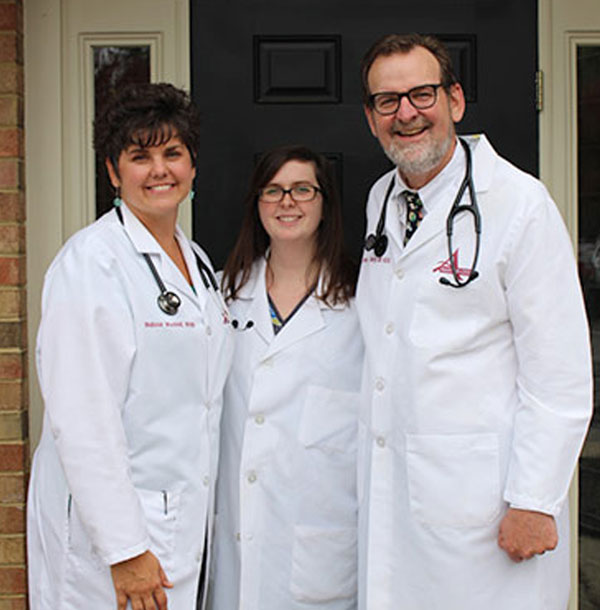What is a Myomectomy?
A myomectomy is the removal of benign fibroid tumors from the uterus through incisions in the lower abdomen. Patients can have a single or numerous fibroid tumors. A myomectomy is a treatment that saves the uterus and a woman’s fertility.
When is it used?
A myomectomy is performed for pelvic pain, back pain, anemia caused by the excessive loss of blood during menstrual cycles, pressure on the bladder, abnormal uterine bleeding, difficulty in becoming pregnant, and discomfort with sexual intercourse.

How do I prepare for a myomectomy?
You may have this procedure performed as an outpatient surgery but most patients have it performed in the main hospital and usually stay 1-2 days in the hospital before being discharged home. You will be asked to not eat or drink anything after midnight the night before the surgery.
What happens during the procedure?
You will be given general anesthesia which will put you to sleep. One or more incisions are made in the lower abdomen. The muscles and connective tissues are cut free to expose the uterus. Each fibroid is removed separately and each area remaining on the uterus is repaired. A barrier may be placed over the uterine incisions to further prevent adhesion (scar tissue) formation. The internal structures are closed in layers and the skin is closed with sutures or staples. If the fibroids are small enough and located on the outside of the uterus (subserousal), the myomectomy may be done laparoscopically using a telescopic instrument (laparoscope) that is inserted through the belly button and 3 other small incisions in the lower abdomen. Some fibroids that are on the inside of the uterus (submucousal) may be removed using a hysteroscope and small surgical instruments inserted into the uterus through the cervix.
What happens after the procedure?
You will be moved to the recovery room while the anesthesia is wearing off. Your pain will be controlled with pain medications and any side effects will be addressed. You will be able to go home that day if you were scheduled for an outpatient surgery. If you have this procedure as an inpatient surgery, you may spend 1-2 days in the hospital.
You may experience pain that radiates to your shoulder. This is caused from the gas that was used during the procedure. You may use an electric heating pad, drink warm beverages and walk to help alleviate this pain. You may bathe and shower as usual. You may wash the incision gently with mild unscented soap.
You will be given prescription pain medication to use for 2 to 7 days after the procedure. A stool softener may also help alleviate or prevent constipation. You will be given 2-6 weeks to recover from the procedure. Many women can return to work after 2 weeks while some may need 6 weeks. Avoid sex or exercising until your postoperative appointment. You may resume driving after you are not taking any narcotic pain medication and you do not feel any pelvic/abdominal pain with stomping your foot down on the break pad. Your next menstrual cycle may be heavier than usual but should occur at about the expected time. Symptoms such as heavy bleeding and pressure usually decrease or are gone once the fibroids are removed. Fertility is restored in about 40% of women.
What are the benefits of this procedure?
You should have lighter bleeding with your menstrual cycles.
You may retain your fertility.
You may have relief from pelvic and/or back pain and pressure.
What are the risks associated with this procedure?
Some of the risks associated with a myomectomy are:
- Excessive bleeding; rarely, may necessitate a hysterectomy
- Perforation of the bowel during surgery
- Complications from anesthesia
- Allergic reaction to any medications used during and after the procedure
- Surgical wound infection
- Development of adhesions (scar tissue) between the uterus and other pelvic structures
- Possible pregnancy complications such as disorders of the placenta, weakness in the uterine wall. These risks are also available when the fibroids are present
- Recurrence of the fibroid tumor or tumors
There are people who have a higher risk of complications which are:
- Obesity
- Smoking
- Poor nutrition
- Recent or chronic illness
- Use of drugs such as antihypertensives, muscle relaxants, tranquilizers, sleeping pills, insulin, sedatives, beta-adrenergic blockers, or cortisone
- Use of mind-altering drugs including narcotics, psychedelics, hallucinogens, marijuana, sedatives, hypnotics or cocaine
When should I call the office?
Call the office right away if:
- You have heavy bleeding from your vagina (you need more than 1 pad or tampon per hour or the bleeding is heavier than your menstrual flow)
- You develop a fever over 100°F (37.8°C)
- You develop headache unrelieved with Tylenol, ibuprofen or narcotic pain medication, muscle aches, dizziness or a general ill feeling
- You have severe abdominal pain or abdominal pain that continues even after you take acetaminophen or aspirin
- You have pain, swelling, redness, drainage or bleeding increases in the surgical area
- You experience nausea, vomiting, constipation or abdominal swelling or other unexplained symptoms
- Excessive vaginal discharge persists beyond 1 month after surgery

